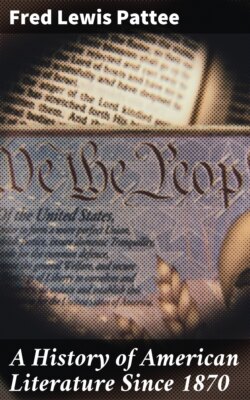Читать книгу A History of American Literature Since 1870 - Fred Lewis Pattee - Страница 50
На сайте Литреса книга снята с продажи.
I
ОглавлениеTable of Contents
The life of Miller is a series of foot-notes to his poems. He was born on the line of the westward march. In the valuable autobiographical preface to the Bear edition of his poems he writes: "My cradle was a covered wagon, pointed west. I was born in a covered wagon, I am told, at or about the time it crossed the line dividing Indiana from Ohio." That was in 1841, and the name given him was Cincinnatus Hiner Miller. His parents, like those of Mark Twain, were of that restless generation that could abide nowhere long, but must press ever on and on westward. His mother's people had migrated from the Yadkin River country in North Carolina with the Boones, "devoted Quakers in search of a newer land"; his grandfather Miller was a Scotchman, a restless pioneer who had fallen at Fort Meigs, leaving a family of small children to come up as they could in the wilderness. One of them, the father of the poet, picked up in a varied career along the border certain elements of book learning that enabled him to teach school in the settlement towns of Ohio and Indiana.
The boy's earliest memories were of the frontier with its land clearing, its Indian neighbors, and its primitive hardships. Schooling he received at the hands of his father. The first book that he could remember was Frémont's Explorations, read aloud to the family by the father until all knew it literally by heart, maps and all. Lured by its enthusiastic descriptions and by reports of a former pupil who had gone to Oregon and by the new act of Congress which gave to every homesteader six hundred and forty acres of land free, on March 17, 1852, with "two big heavily laden wagons, with eight yoke of oxen to each, a carriage and two horses for mother and baby sister, and a single horse for the three boys to ride," the family set out across the wild continent of America. "The distance," he records, "counting the contours of often roundabout ways, was quite, or nearly, three thousand miles. The time was seven months and five days. There were no bridges, no railroad levels, nothing of the sort. We had only the road as nature had made it. Many times, at night, after ascending a stream to find a ford, we could look back and see our smoldering camp-fires of the day before."
That heroic journey into the unknown West with its awful dangers, its romantic strangeness, its patriarchal conditions, its constant demand for self-dependence, made an indelible impress on the young lad. It was a journey of Argonauts, one of the thousands of journeys that made picturesque a whole epoch. He has described it in some of the most stirring of his poems. All through his poetry occur stanzas like this:
